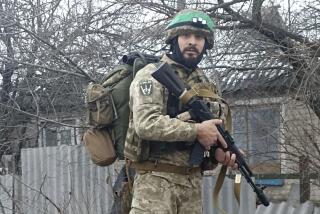Children’s Deaths Cloud Human Rights in Colombia
- Share via
BOGOTA, Colombia — The 41 soldiers and officers who fired on a school nature hike in northern Colombia last week, killing six children and causing an international uproar, have been suspended from combat duty, the military tribunal investigating the case confirmed Saturday.
Tuesday’s tragedy has raised questions about the Colombian army’s commitment to human rights--a crucial issue as the United States prepares to provide this country with $521 million in military anti-narcotics assistance, more than one-third of a new $1.3-billion anti-drug package.
Human error probably was a factor in the incident in war-torn Antioquia province, civilian Defense Minister Luis Fernando Ramirez acknowledged at a news conference Friday evening. But with the U.S. State Department preparing a report on human rights in Colombia, he insisted that the case did not involve any human rights violations.
U.S. law strictly forbids aid to military organizations whose members have credible accusations of human rights abuses pending against them.
“Clearly, this was not a violation of human rights,” Ramirez said. “Clearly, the army had no intention of killing children. What has to be determined is whether this was avoidable.”
A day after the deaths, army commander Gen. Jorge Enrique Mora accused members of Colombia’s second-largest guerrilla group, the National Liberation Army, or ELN, of using the children as human shields as the rebels tried to escape pursuit by soldiers.
However, adult witnesses and an ELN communique insisted that no insurgents were in sight at the time that soldiers began firing on the children, ages 7 to 12.
The soldiers had exchanged fire with a rebel band less than three miles from the site where the children were killed, near the town of Pueblorrico, and the troops were pursuing the guerrillas when they came across the children, according to army reports.
Troops involved in the shooting testified that they had seen not children but only silhouettes before they fired, armed forces commander Gen. Fernando Tapias said during the news conference with Ramirez.
Surviving schoolmates told how soldiers broke into tears when they saw the slain children.
A soldier “touched me on the head and told me to be calm, and at that moment he started to cry,” a 10-year-old girl told the daily newspaper El Espectador. Then, she said, the soldier shouted, “We killed children!”
Investigators are examining spent cartridges to determine if they came from rifles issued to soldiers, Tapias said.
“Any of the men in the armed forces would give his life if it would bring these children back,” he said.
For many Colombians the case is a stinging reminder that their country’s decades-old conflict is claiming more and more young lives.
The nation’s largest rebel group, the Revolutionary Armed Forces of Colombia, or FARC, openly recruits 15-year-olds, so teenagers often figure among battlefield casualties. Child advocacy groups, meanwhile, lament that children even younger than 15 are pressed into service as messengers and informants by Colombia’s warring factions.
Social workers in the city of Medellin say that youth crime bands there are often bankrolled and armed by either guerrillas or right-wing private armies in return for their services as assassins or kidnappers.
Further, the children’s killings point out again how unprotected civilians are in the brutal war involving three guerrilla groups, the right-wing private armies that pursue them and the armed forces.
The number of civilian deaths has not diminished even though human rights groups acknowledge that abuses committed by the armed forces have dropped significantly in recent years. Private armies are accused of committing most atrocities, and reports of abuses and even massacres by guerrillas are also frequent.
Since President Andres Pastrana took office two years ago, his administration has brought cases against high-ranking military officers accused of tolerating or even aiding private armies.
The armed forces have added human rights classes to their training, but the rights of civilians remain a new and somewhat cloudy concept here, a Red Cross survey found.
Special correspondent Morris reported from Bogota and staff writer Darling from Mexico City.
More to Read
Sign up for Essential California
The most important California stories and recommendations in your inbox every morning.
You may occasionally receive promotional content from the Los Angeles Times.













